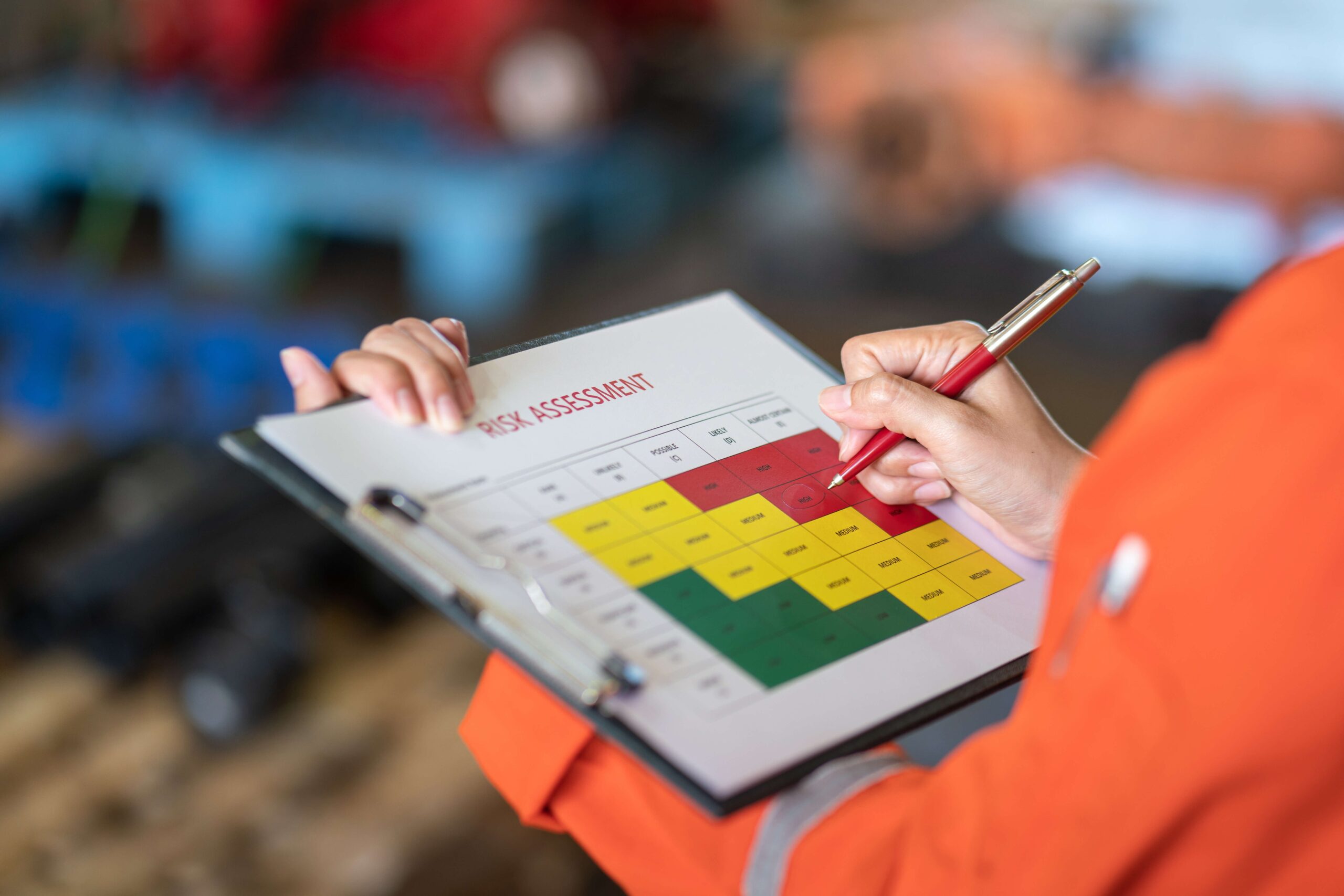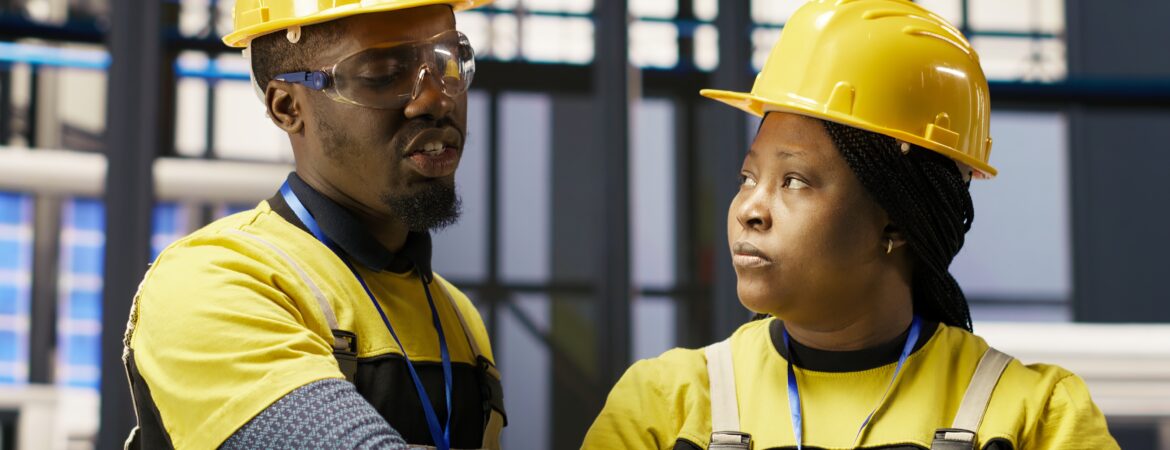Let’s be honest workplace safety often feels like paperwork and regulations until something goes wrong. Then suddenly, it’s everything.
Whether you’re running a construction site in Lagos, managing a manufacturing facility in Kano, or overseeing operations in the oil and gas sector, safety isn’t just about ticking boxes. It’s about getting your people home safely every day while keeping your business running smoothly.
The good news? You don’t need a massive budget or a PhD in safety management to get this right. You just need to focus on the fundamentals that actually work.
1. Start With Knowing What Could Go Wrong (Risk Assessments)
Before you can fix problems, you need to know where they are. That’s where comprehensive risk assessments come in.
Think of it as a health check for your workplace. You’re looking for anything that could hurt someone loose cables, unstable structures, chemical exposures, machinery without guards, or even poor lighting that makes accidents more likely.
The payoff is real: identifying hazards and eliminating or controlling them as early as possible helps prevent injuries and illnesses IIF Home : U.S. Bureau of Labor Statistics. Studies on job hazard analysis show that proactive risk identification significantly reduces workplace incidents.
In Nigeria, the Federal Ministry of Labour has emphasized that stronger safety measures including regular risk assessments are critical for sustainable economic growth. While specific submission requirements vary by industry, conducting regular risk assessments is one of the smartest investments you’ll make.
Pro tip: Walk your workplace monthly with fresh eyes. Better yet, ask employees where they see risks ; they’re the ones doing the work every day.
2. Write Down Your Safety Rules (And Actually Follow Them)
“We’ve always done it this way” isn’t a safety policy. Your team needs clear, written procedures that cover everything from operating equipment to responding to emergencies.
Nigerian occupational health and safety guidelines mandate that employers maintain written procedures covering fire safety, equipment use, and emergency response. These aren’t suggestionsthey’re requirements that protect both your workers and your business.
But here’s the thing: a safety manual gathering dust on a shelf protects nobody. Your policies need to be:
- Easy to understand(skip the legal jargon)
- Accessible(everyone should know where to find them)
- Updated regularly(as your operations change)
- Actually enforced(consistently, fairly, for everyone including management)
Think of your safety policies as the rulebook for keeping everyone safe. If people don’t know the rules or see them being ignored, they won’t follow them when it matters most.
3. Train Like Lives Depend On It (Because They Do)
Knowing what to do in theory is completely different from doing it under pressure. That’s why regular training and emergency drills aren’t optional they’re essential.
WHO and ILO data confirms that workplace health and safety training dramatically reduces injury risks and improves emergency response Jop hazarde analysis osha3071 | PDF. When people have practiced evacuating or using fire extinguishers, they don’t freeze or panic when real danger strikes.
Regular drills ideally conducted quarterly build muscle memory and confidence. Your training program should cover:
- Equipment operation(how to use it safely, not just how to use it)
- Hazard recognition(spotting problems before accidents happen)
- Emergency procedures(evacuation routes, assembly points, who does what)
- First aid basics(because seconds matter)
- Fire response(when to fight a fire, when to run)
Make training engaging, not boring. Use real scenarios from your workplace. Let people practice. Answer their questions. The goal is muscle memory, not just checking a compliance box.
4. Take Fire Safety Seriously (Before You Have To)
In the first half of 2024 alone, Lagos State witnessed 1,085 fire outbreaks HSE (Health, Safety, and Environment) | ESG | ENEOS Xplora that’s about six fires every single day. Nationwide in 2024, Nigeria lost 100 lives and N67.1 billion worth of property to fire incidents ESG Ratings | MSCI. The damage goes beyond destroyed property fires kill people, shut down businesses permanently, and destroy livelihoods.
The Lagos State Safety Commission now requires fire audits for commercial properties, and for good reason. Your fire safety infrastructure should include:
- Fire alarmsthat actually work (test them monthly)
- Extinguishersin accessible locations (and people trained to use them)
- Sprinkler systemswhere appropriate
- Smoke containment measures
- Clear evacuation routes(that aren’t blocked by storage or equipment)
- Emergency lighting(because fires often cut power)
Here’s what many businesses miss: you need to test this equipment routinely. A fire extinguisher that’s been sitting for three years without inspection might not work when you need it. Regular testing and maintenance aren’t expensive insurance they’re your only insurance.
5. Make PPE Non-Negotiable (Especially in High-Risk Industries)
In construction, manufacturing, and oil and gas, Personal Protective Equipment isn’t a suggestion it’s the last line of defense between your workers and serious injury or death.
CDC NIOSH guidance confirms that proper PPE significantly reduces workplace injuries and fatalities when used correctly and consistently How Effective Is Nigeria’s Fire Service Despite Huge Allocations? – HumAngle. We’re talking about helmets preventing head injuries, safety boots protecting feet, gloves preventing chemical burns, and respirators keeping lungs clean.
Nigeria’s oil and gas sector has seen increasing regulatory oversight and stricter enforcement of safety standards following the Petroleum Industry Act implementation. But PPE only works when:
- It fits properly(uncomfortable PPE gets left in lockers)
- It’s appropriate for the hazard(not all gloves protect against all chemicals)
- People actually wear it(which requires both culture and enforcement)
- It’s maintained(damaged PPE is worse than no PPE because it creates false confidence)
As a business owner or safety manager, your job is to make PPE use so normal that not wearing it feels weird. That starts with leadership wearing PPE in the field—no exceptions, no shortcuts.
6. Build a Culture Where Safety Is Everyone’s Job
This is where most safety programs either thrive or die. You can have all the policies, training, and equipment in the world, but if your workplace culture treats safety as someone else’s problem, people will get hurt.
The International Labour Organization found that companies with strong safety cultures enjoy higher productivity and lower employee turnover Oil & Gas Laws and Regulations Report 2025 Nigeria. People want to work where they feel protected, and they perform better when they’re not worried about getting injured.
Building this culture means:
- Rewarding safe behavior(not just punishing unsafe behavior)
- Encouraging hazard reporting(without fear of blame)
- Leading by example(management follows the same rules)
- Listening to frontline workers(they see risks you might miss)
- Celebrating safety milestones(recognize teams that work accident-free)
- Learning from near-misses(not just investigating accidents after they happen)
When someone reports a hazard, thank them. When a team completes a project without incidents, acknowledge it. When you see unsafe behavior, address it immediately but constructively. Safety culture is built through thousands of small actions, not one big policy.
The Bottom Line: Safety Is a Business Strategy, Not Just a Requirement
Every naira you invest in workplace safety returns multiplied. You get fewer accidents, lower insurance premiums, better employee retention, higher productivity, and access to clients who demand safety compliance.
The companies winning in Nigeria’s competitive business environment aren’t just the ones with the best products or services—they’re the ones where people want to work because they know they’ll go home safe every day.
Need help implementing these workplace safety practices? Hybrid Group provides comprehensive HSE solutions for Nigerian businesses from risk assessments and safety training to fire safety audits and compliance support.
Let’s build a safer workplace together.
Updated References
- OSHA Job Hazard Analysis (Revised 2002, Still Current)– https://www.osha.gov/sites/default/files/publications/osha3071.pdf
- Federal Ministry of Labour & Employment Nigeria (2023)– https://labour.gov.ng
- ILO Nigeria Country Profile on Occupational Health and Safety– https://www.ilo.org/africa/countries-covered/nigeria/lang–en/index.htm
- WHO/ILO Joint Estimates on Work-Related Burden (2021)– https://www.ilo.org/global/about-the-ilo/newsroom/news/WCMS_817944/lang–en/index.htm
- Lagos State Fire and Rescue Service (2024)– Fire incident data via Punch Newspapers: https://punchng.com/lagos-records-1085-fire-outbreaks-in-six-months/
- Federal Fire Service Nigeria (2024)– National fire statistics via Punch Newspapers: https://punchng.com/nigeria-lost-100-lives-n67-1bn-to-fire-outbreaks-in-2024/
- CDC NIOSH Personal Protective Equipment– https://www.cdc.gov/niosh/ppe/
- ILO Safety Culture and Productivity– https://www.ilo.org/global/topics/safety-and-health-at-work/lang–en/index.htm
- Nigerian Upstream Petroleum Regulatory Commission (NUPRC)– https://www.nuprc.gov.ng
Next: Workplace Risk Assessment: A Beginner’s Guide for Nigerian Businesses

Our 2025 Course Offerings Include:
- ISO 45001 Foundation and Implementation Training – Master the fundamentals and practical application
- Lead Auditor Certification Programs – Develop advanced auditing skills and certification
- Migration Support from OHSAS 18001 – Seamlessly transition to ISO 45001
- Advanced Risk Assessment Workshops – Build sophisticated risk management capabilities
- Cultural Transformation Masterclasses – Learn to drive lasting safety culture change
Additionally, our implementation courses include post-training support throughout the certification process. We understand that real transformation happens in the follow-through, not just the classroom.
Whether you’re a safety professional seeking to advance your expertise, a business leader pursuing competitive advantage through operational excellence, or a consultant wanting to offer more value to clients, we have a program designed for your specific needs.
Because ultimately, the best workplace safety standard is one that actually keeps people safe while driving business success. That’s exactly what ISO 45001 was designed to accomplish.
Ready to start your transformation?
Take these immediate next steps:
- Download our 2025 HSE Certification Calendar for comprehensive training opportunities
- Schedule a consultation to discuss your specific quality management needs Phone 1: +234 201 295 4556, Phone 2: +234 201 295 4560, GHANA: +233 24 440 5755) to discuss your specific needs.
- Join our upcoming ISO fundamentals and internal auditor training sessions
- Contact Hybrid Group today info@hybrid-hse.com to partner with experts dedicated to creating safer and more productive workplaces.
Join us in our next installment as we explore occupational health and safety management systems—another critical component of operational excellence for Nigerian businesses.
Have you implemented ISO 9001 in your Nigerian operation? What challenges did you face, and what results have you achieved? Share your experience with our community of safety professionals and business leaders.
About Hybrid Group: As one of Nigeria’s most trusted HSE consultancies, we specialise in helping organisations across Lagos, Warri, and throughout Nigeria achieve operational excellence through strategic quality, environmental, and safety management systems implementation.
Your investment in safety qualifications may be the highest-returning decision you make this year.


